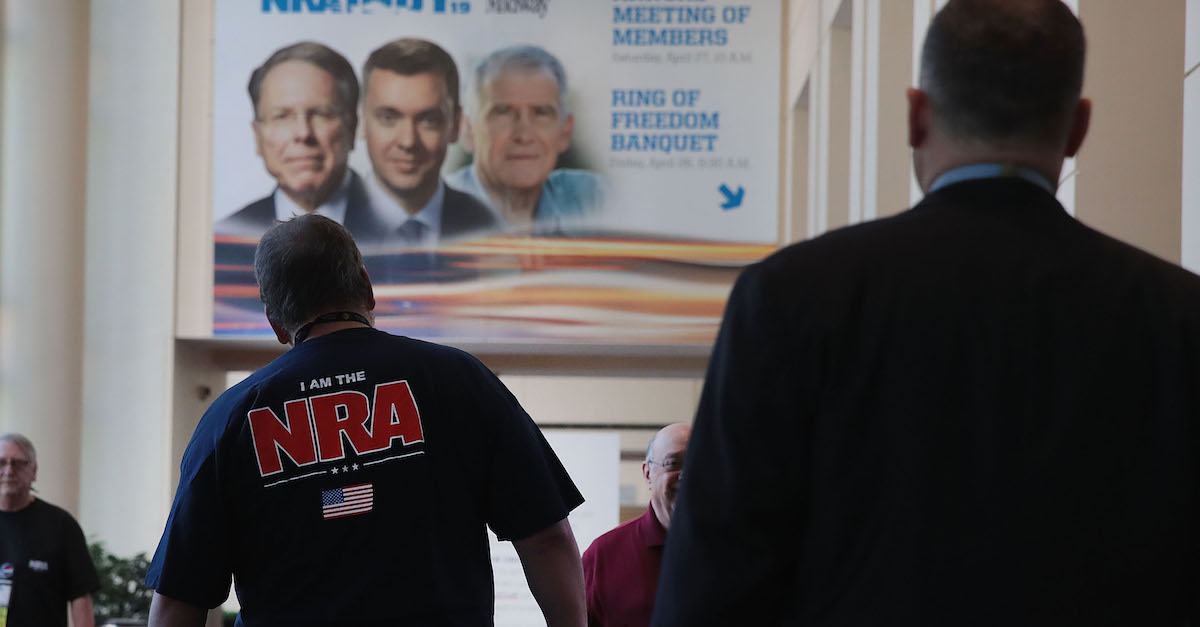
Guest walk under a poster featuring Wayne LaPierre (L), NRA vice president and CEO, Chris Cox (C), executive director of the NRA-ILA, and NRA president Oliver North outside a conference room where the NRA annual meeting of members was being held at the 148th NRA Annual Meetings & Exhibits on April 27, 2019 in Indianapolis, Indiana.
The National Rifle Association cannot transfer, stay or dismiss the New York Attorney General’s lawsuit filed in Manhattan seeking its dissolution, a judge ruled on Thursday.
“Today’s order reaffirms what we’ve known all along: the NRA does not get to dictate if and where they will answer for their actions,” Attorney General Letitia James (D) said in a statement following the ruling. “We thank the court for allowing our case to move forward and look forward to holding the NRA accountable.”
Attorney General James alleges that NRA leader Wayne LaPierre used the group as a “personal piggy bank,” detailing trips on his private jet to the tropics and African safaris with donor money. The attorney general accused NRA executives of pocketing millions for their personal benefit, filing false regulatory filings, awarding no-show contracts to loyalists, and retaliating against whistleblowers.
It is a similar basis upon which the New York Attorney General’s office shut down the Trump Foundation, in an action begun by James’s predecessors.
The NRA’s attorney Sarah Rogers, from the firm Brewers, Attorneys & Counselors, argued that the gravity of the action demands a venue of their choice.
“If you’re a non-profit and you’re fighting for your very existence, you have the right to have that fight in the [venue] where you chose,” Rogers said.
Judge Joel Cohen noted that the NRA’s headquarters are in Virginia, but the certificate of incorporation in the Empire State was in New York County.
“I think it would be inappropriate to conclude that the attorney general cannot proceed in state court just because one of the defendants would prefer to proceed in federal court,” Cohen said.
The Democratic attorney general has described the action as a straightforward application of New York charity law, but the NRA calls it a vendetta laid bare before the current attorney general was elected into office.
“The NRA holds (itself) out as a charitable organization, but in fact, (it) really (is) a terrorist organization,” James told Ebony Magazine, in a 2018 interview on the campaign trail.
Rogers cited that quote on behalf of the gun group on Thursday morning.
“This is a case of historic constitutional importance,” Rogers said, citing support from the American Civil Liberties Union‘s national legal director David Cole and law professor Jonathan Turley, who backed former president Donald Trump in his first impeachment proceedings.
The day the attorney general filed her lawsuit on Aug. 6, 2020, the NRA filed a federal countersuit against her in Albany, claiming that the case violates the First Amendment rights of its more than 5 million members.
“We fully expect that the federal court will dismiss the action,” Assistant Attorney General Jonathan Conley said.
The NRA argues that it would be inconvenient to fight the attorney general’s lawsuit in state court in Manhattan at the same time that it is pursuing counterclaims in federal court in Albany, but Judge Cohen suggested they brought that upon themselves.
“If the NRA wanted to avoid litigating in two places, why didn’t it just bring its case here?” Cohen asked.
That is not the only procedural wrench the NRA tossed into the proceedings.
Declaring the group was “DUMPING New York,” the NRA filed for bankruptcy in Texas in the hopes to torpedo the attorney general’s litigation and what it called the state’s “toxic political environment.”
Oral arguments took place on Thursday despite that maneuver, without objection at this time by the NRA.
(Photo by Scott Olson/Getty Images)